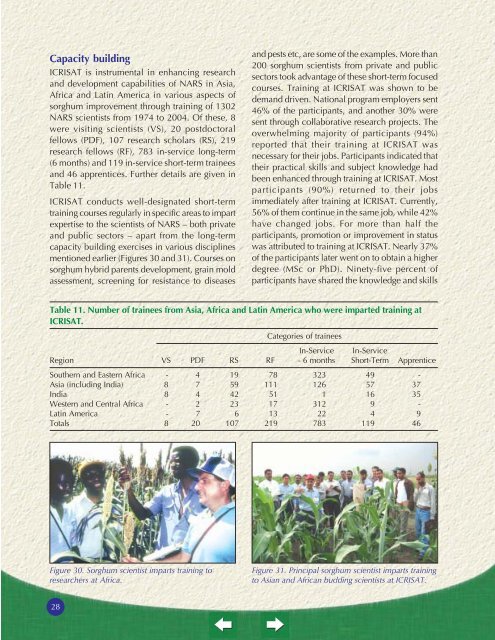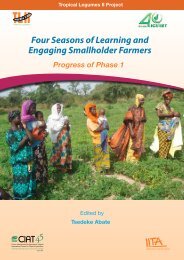Sorghum - icrisat
Sorghum - icrisat
Sorghum - icrisat
Create successful ePaper yourself
Turn your PDF publications into a flip-book with our unique Google optimized e-Paper software.
Capacity building<br />
ICRISAT is instrumental in enhancing research<br />
and development capabilities of NARS in Asia,<br />
Africa and Latin America in various aspects of<br />
sorghum improvement through training of 1302<br />
NARS scientists from 1974 to 2004. Of these, 8<br />
were visiting scientists (VS), 20 postdoctoral<br />
fellows (PDF), 107 research scholars (RS), 219<br />
research fellows (RF), 783 in-service long-term<br />
(6 months) and 119 in-service short-term trainees<br />
and 46 apprentices. Further details are given in<br />
Table 11.<br />
ICRISAT conducts well-designated short-term<br />
training courses regularly in specific areas to impart<br />
expertise to the scientists of NARS – both private<br />
and public sectors – apart from the long-term<br />
capacity building exercises in various disciplines<br />
mentioned earlier (Figures 30 and 31). Courses on<br />
sorghum hybrid parents development, grain mold<br />
assessment, screening for resistance to diseases<br />
and pests etc, are some of the examples. More than<br />
200 sorghum scientists from private and public<br />
sectors took advantage of these short-term focused<br />
courses. Training at ICRISAT was shown to be<br />
demand driven. National program employers sent<br />
46% of the participants, and another 30% were<br />
sent through collaborative research projects. The<br />
overwhelming majority of participants (94%)<br />
reported that their training at ICRISAT was<br />
necessary for their jobs. Participants indicated that<br />
their practical skills and subject knowledge had<br />
been enhanced through training at ICRISAT. Most<br />
participants (90%) returned to their jobs<br />
immediately after training at ICRISAT. Currently,<br />
56% of them continue in the same job, while 42%<br />
have changed jobs. For more than half the<br />
participants, promotion or improvement in status<br />
was attributed to training at ICRISAT. Nearly 37%<br />
of the participants later went on to obtain a higher<br />
degree (MSc or PhD). Ninety-five percent of<br />
participants have shared the knowledge and skills<br />
Table 11. Number of trainees from Asia, Africa and Latin America who were imparted training at<br />
ICRISAT.<br />
Categories of trainees<br />
In-Service In-Service<br />
Region VS PDF RS RF - 6 months Short-Term Apprentice<br />
Southern and Eastern Africa - 4 19 78 323 49 -<br />
Asia (including India) 8 7 59 111 126 57 37<br />
India 8 4 42 51 1 16 35<br />
Western and Central Africa - 2 23 17 312 9 -<br />
Latin America - 7 6 13 22 4 9<br />
Totals 8 20 107 219 783 119 46<br />
Figure 30. <strong>Sorghum</strong> scientist imparts training to<br />
researchers at Africa.<br />
Figure 31. Principal sorghum scientist imparts training<br />
to Asian and African budding scientists at ICRISAT.<br />
28
















